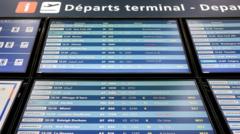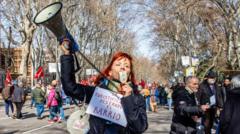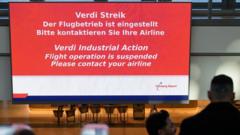**Air Canada has suspended all operations following a strike by flight attendants, prompting government action to enforce arbitration and minimize travel disruptions. The strike stems from unresolved issues around wages and unpaid labor hours, inciting significant concerns for passengers and the tourism industry.**
**Air Canada Grounds Flights Amid Flight Attendants’ Strike: Government Steps In**

**Air Canada Grounds Flights Amid Flight Attendants’ Strike: Government Steps In**
**As a strike by Air Canada flight attendants leads to widespread flight cancellations, federal government intervention aims to resolve tensions between airline and union workers.**
---
Air Canada has ceased all operations in response to a flight attendants' strike that began on Saturday, following a 72-hour notice given earlier in the week. The strike comes after prolonged contract negotiations that stalled over critical issues, including wages and unpaid work hours for the airline’s cabin crew. According to the Canadian Union of Public Employees (CUPE), which represents the attendants, the negotiations failed to address fundamental concerns, leading to the strike’s initiation at midnight.
As tensions escalated, Air Canada began to halt and delay flights, with reports indicating up to 500 flights were anticipated to be canceled, affecting approximately 100,000 travelers. Officials warned that a total stoppage of flying could start over the weekend if a resolution wasn't reached. However, flights operated by Air Canada Express, which serve about 20% of the daily passengers, remain unaffected. A complete operational shutdown could impact 130,000 daily customers, including 25,000 Canadians.
In a response to the strike notice, Air Canada rapidly issued a lock-out notice and commenced winding down its operations. Mark Nasr, the airline’s Chief Operations Officer, reiterated the complexity of the airline's service system, cautioning that ramping operations back up is not an instantaneous process.
The dispute has stirred significant tension; CUPE claims to have negotiated in good faith for over eight months, only to find Air Canada's proposals inadequate with a compensation increase that fails to keep pace with inflation. The airline’s offer suggested a 38% increase over four years, including a 25% raise in the first year, yet union representatives argue this offer is essentially a pay cut when considering the economic landscape.
As pressure mounted from various sectors, the Canadian government intervened, compelling both parties into binding arbitration under Section 107 of the Canada Labour Code, as stated by Jobs Minister Patty Hajdu. The government cited the necessity to safeguard industrial peace and protect Canadian interests against the unfolding crisis.
CUPE has rebuffed the government’s intervention, suggesting it undermines their charter rights and questioning whether arbitration will adequately address the underlying issues. The airline pushed for arbitration earlier, yet the union declined this arrangement, proposing instead for negotiations to occur free from government influence.
As the strike persists, its duration remains uncertain. A historical reference to a similar pilots' strike in 1998, lasting 13 days and incurring significant financial losses for the airline, casts a shadow over the current situation. In the interim, Air Canada has urged passengers to avoid heading to airports unless they possess tickets with alternative airlines, assuring those impacted by cancellations that full refunds and alternate travel solutions are being arranged.
The repercussions of the strike are being felt more widely, as stakeholders from various regions, such as the Toronto Board of Trade, have called for government intervention, while Newfoundland and Labrador’s provincial government labeled the strike's impact on tourism as "catastrophic" during the summer months.
Air Canada has ceased all operations in response to a flight attendants' strike that began on Saturday, following a 72-hour notice given earlier in the week. The strike comes after prolonged contract negotiations that stalled over critical issues, including wages and unpaid work hours for the airline’s cabin crew. According to the Canadian Union of Public Employees (CUPE), which represents the attendants, the negotiations failed to address fundamental concerns, leading to the strike’s initiation at midnight.
As tensions escalated, Air Canada began to halt and delay flights, with reports indicating up to 500 flights were anticipated to be canceled, affecting approximately 100,000 travelers. Officials warned that a total stoppage of flying could start over the weekend if a resolution wasn't reached. However, flights operated by Air Canada Express, which serve about 20% of the daily passengers, remain unaffected. A complete operational shutdown could impact 130,000 daily customers, including 25,000 Canadians.
In a response to the strike notice, Air Canada rapidly issued a lock-out notice and commenced winding down its operations. Mark Nasr, the airline’s Chief Operations Officer, reiterated the complexity of the airline's service system, cautioning that ramping operations back up is not an instantaneous process.
The dispute has stirred significant tension; CUPE claims to have negotiated in good faith for over eight months, only to find Air Canada's proposals inadequate with a compensation increase that fails to keep pace with inflation. The airline’s offer suggested a 38% increase over four years, including a 25% raise in the first year, yet union representatives argue this offer is essentially a pay cut when considering the economic landscape.
As pressure mounted from various sectors, the Canadian government intervened, compelling both parties into binding arbitration under Section 107 of the Canada Labour Code, as stated by Jobs Minister Patty Hajdu. The government cited the necessity to safeguard industrial peace and protect Canadian interests against the unfolding crisis.
CUPE has rebuffed the government’s intervention, suggesting it undermines their charter rights and questioning whether arbitration will adequately address the underlying issues. The airline pushed for arbitration earlier, yet the union declined this arrangement, proposing instead for negotiations to occur free from government influence.
As the strike persists, its duration remains uncertain. A historical reference to a similar pilots' strike in 1998, lasting 13 days and incurring significant financial losses for the airline, casts a shadow over the current situation. In the interim, Air Canada has urged passengers to avoid heading to airports unless they possess tickets with alternative airlines, assuring those impacted by cancellations that full refunds and alternate travel solutions are being arranged.
The repercussions of the strike are being felt more widely, as stakeholders from various regions, such as the Toronto Board of Trade, have called for government intervention, while Newfoundland and Labrador’s provincial government labeled the strike's impact on tourism as "catastrophic" during the summer months.






















